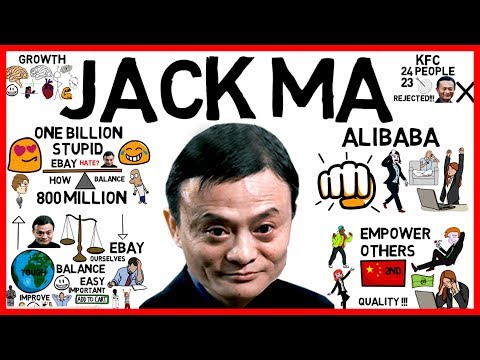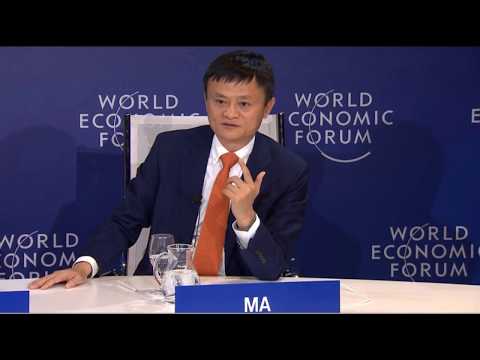How does Jack Ma approach negotiations with business partners and stakeholders? Jack Ma, the co-founder of Alibaba Group, is known for his unique approach to negotiations. With his charismatic personality and strategic mindset, he has successfully built strong relationships with business partners and stakeholders. In this blog post, we will delve into the specific tactics and strategies that Jack Ma employs during negotiations, providing you with a comprehensive understanding of his approach.
1. Building rapport and trust: Jack Ma recognizes the importance of building rapport and trust with his counterparts. He believes that negotiations should not be solely focused on financial gains but also on fostering long-term partnerships. To achieve this, he invests time in understanding the needs and motivations of his counterparts, actively listening to their perspectives, and empathizing with their concerns.
2. Emphasizing win-win outcomes: Jack Ma is a firm believer in win-win outcomes. He believes that negotiations should be approached with the mindset of creating value for all parties involved. Instead of seeking to dominate or exploit the other party, he focuses on finding common ground and mutually beneficial solutions. This approach not only strengthens relationships but also enhances the likelihood of successful negotiations.
3. Leveraging his network: Jack Ma understands the power of his extensive network. He leverages his connections to gather information, seek advice, and build alliances. By utilizing his network, he gains valuable insights into the industry, market trends, and the strengths and weaknesses of his counterparts. This knowledge gives him a competitive advantage during negotiations, allowing him to make well-informed decisions and negotiate from a position of strength.
4. Maintaining a positive attitude: Jack Ma approaches negotiations with a positive mindset, regardless of the challenges or obstacles that may arise. He believes that maintaining a positive attitude helps create a conducive environment for productive negotiations. By remaining optimistic and solution-oriented, he is able to overcome hurdles and find innovative solutions that satisfy both parties.
5. Effective communication: Communication is a key aspect of Jack Ma’s negotiation approach. He understands the importance of clear and concise communication to avoid misunderstandings and foster effective collaboration. Jack Ma is known for his ability to articulate his ideas and persuade others through compelling storytelling. He uses anecdotes and real-life examples to illustrate his points, making it easier for his counterparts to grasp complex concepts and align their interests with his own.
6. Flexibility and adaptability: Jack Ma recognizes that negotiations are not always linear or predictable. He embraces flexibility and adaptability, adjusting his strategies and tactics based on the specific circumstances of each negotiation. By being open to new ideas and willing to compromise, he can navigate through challenging situations and find creative solutions that satisfy both parties.
7. Long-term perspective: Jack Ma takes a long-term perspective when approaching negotiations. He understands that building sustainable relationships requires patience, trust, and a commitment to shared success. Instead of focusing solely on short-term gains, he seeks to establish partnerships that will endure over time.
Decoding Jack Ma’s Unconventional Leadership Style: A Paradigm Shift in Corporate Leadership
Decoding Jack Ma’s Unconventional Leadership Style: A Paradigm Shift in Corporate Leadership
1. Jack Ma’s Approach to Negotiations with Business Partners and Stakeholders
– Jack Ma, the co-founder of Alibaba Group, approaches negotiations with a unique perspective that sets him apart from traditional corporate leaders. He believes in building trust and establishing long-term relationships with business partners and stakeholders, rather than focusing solely on short-term gains. Ma understands that negotiations are not just about reaching a deal, but also about creating mutual benefits and win-win situations for all parties involved.
– Instead of using aggressive tactics or exerting dominance, Ma adopts a collaborative approach. He values open communication, transparency, and active listening during negotiations. By actively listening to the concerns and needs of his partners, Ma is able to find common ground and explore innovative solutions. This approach allows him to build strong partnerships based on trust and mutual understanding.
– Furthermore, Ma is known for his unconventional style of negotiation. He often injects humor and storytelling into his negotiations, which helps to break the ice and create a more relaxed atmosphere. This approach not only helps to build rapport but also allows for more creative problem-solving. By thinking outside the box and encouraging unconventional ideas, Ma has been able to achieve groundbreaking deals and partnerships.
– Lastly, Jack Ma recognizes the importance of cultural intelligence in negotiations. He understands that different cultures have different negotiation styles and preferences. Therefore, he takes the time to study and adapt to the cultural nuances of his business partners and stakeholders. This cultural sensitivity allows him to navigate negotiations more effectively and build stronger relationships.
In conclusion, Jack Ma’s approach to negotiations with business partners and stakeholders is characterized by trust, collaboration, humor, storytelling, and cultural intelligence. His unconventional leadership style has led to paradigm shifts in corporate negotiations, emphasizing long-term partnerships and win-win outcomes. By adopting these strategies, leaders can learn from Ma’s success and create a more inclusive and effective negotiation process.
The Secrets Behind Jack Ma’s Phenomenal Success in Business: Unraveling the Tactics of Alibaba’s Visionary Founder
The Secrets Behind Jack Ma’s Phenomenal Success in Business: Unraveling the Tactics of Alibaba’s Visionary Founder
1. Building Relationships: Jack Ma understands the importance of building strong relationships with business partners and stakeholders. He approaches negotiations with a focus on establishing trust and rapport. Instead of solely focusing on the deal at hand, he takes the time to get to know the other party, their values, and their goals. This approach helps him create win-win situations that benefit both parties in the long run.
2. Embracing Openness and Transparency: Jack Ma believes in transparency and openness in negotiations. He encourages open communication and sharing of information to foster trust and collaboration. By being transparent about his intentions, expectations, and limitations, he sets the stage for productive negotiations. This approach allows him to build stronger partnerships based on mutual understanding and shared goals.
3. Thinking Long-Term: Jack Ma is known for his long-term perspective in business. He doesn’t focus on short-term gains or quick wins. Instead, he looks at the bigger picture and considers the long-term implications of his decisions. This mindset allows him to negotiate deals that have a sustainable impact and create lasting value for all parties involved.
4. Embracing Innovation: Jack Ma understands the importance of embracing innovation in negotiations. He is constantly looking for creative solutions and out-of-the-box ideas that can drive business growth and success. By bringing innovative ideas to the table, he differentiates himself from competitors and opens up new possibilities for collaboration.
5. Adapting to Cultural Differences: Jack Ma recognizes the importance of cultural sensitivity in negotiations. He takes the time to understand the cultural nuances of his business partners and stakeholders, adapting his negotiation style accordingly. This cultural intelligence helps him navigate diverse business environments and build strong relationships across borders.
6. Balancing Confidence and Humility: Jack Ma strikes a unique balance between confidence and humility in negotiations. While he exudes confidence in his ideas and vision, he also acknowledges the expertise and contributions of others. This humility allows him to listen and learn from his counterparts, fostering a collaborative negotiation process.
7. Leveraging Technology: Jack Ma leverages technology to streamline and enhance the negotiation process. He embraces digital platforms and tools that facilitate communication, information sharing, and collaboration. By using technology effectively, he maximizes efficiency and effectiveness in negotiations.
8. Being Resilient: Jack Ma’s success can also be attributed to his resilience in negotiations. He doesn’t shy away from challenges or setbacks but instead views them as opportunities for growth and learning. This resilience allows him to navigate through tough negotiations and find solutions even in the face of adversity.
In conclusion, Jack Ma’s approach to negotiations with business partners and stakeholders is characterized by building relationships, embracing openness and transparency, thinking long-term, embracing innovation, adapting to cultural differences, balancing confidence and humility, leveraging technology, and being resilient.
Decoding Alibaba’s Business Strategy: Unveiling the Secrets Behind the E-commerce Giant’s Success
Decoding Alibaba’s Business Strategy: Unveiling the Secrets Behind the E-commerce Giant’s Success is a comprehensive book that delves into the inner workings of Alibaba, one of the world’s largest e-commerce companies. The book explores various aspects of Alibaba’s business strategy, shedding light on the secrets behind its remarkable success. In this article, we will focus on how Jack Ma, the founder of Alibaba, approaches negotiations with business partners and stakeholders.
1. Building Relationships: Jack Ma understands the importance of building strong relationships in business negotiations. He believes that trust and mutual understanding are crucial for successful partnerships. Ma invests time and effort in getting to know his business partners and stakeholders on a personal level, which enables him to better understand their needs and concerns. This approach fosters trust and lays the foundation for fruitful negotiations.
2. Win-Win Approach: Jack Ma is known for his win-win approach to negotiations. He believes that both parties should benefit from any business deal. Instead of focusing solely on his own interests, Ma aims to find a middle ground that satisfies all parties involved. This approach not only helps in securing favorable deals but also strengthens long-term relationships with business partners and stakeholders.
3. Long-Term Perspective: Jack Ma takes a long-term perspective when negotiating with business partners and stakeholders. He understands that sustainable success requires nurturing long-lasting relationships. Ma focuses on creating partnerships that go beyond short-term gains and aims to build strategic alliances that can withstand the test of time. This approach enables Alibaba to forge strong bonds with its partners and ensures mutual growth and prosperity.
4. Open Communication: Communication is key in negotiations, and Jack Ma recognizes its importance. He encourages open and transparent communication with business partners and stakeholders. Ma believes that clear communication helps in understanding each other’s expectations, resolving conflicts, and finding common ground. By fostering a culture of open communication, Alibaba is able to build trust and maintain strong relationships with its partners.
5. Adaptability: Jack Ma understands the importance of being adaptable in negotiations. He is willing to adjust his strategies and approaches based on the specific needs and circumstances of each negotiation. Ma’s ability to adapt to different situations allows him to navigate complex negotiations effectively and find innovative solutions that benefit both parties.
In conclusion, Jack Ma approaches negotiations with business partners and stakeholders by building relationships, adopting a win-win approach, taking a long-term perspective, promoting open communication, and being adaptable. These strategies have played a significant role in Alibaba’s success and have helped the company forge strong partnerships that contribute to its continued growth.
In conclusion, Jack Ma approaches negotiations with business partners and stakeholders in a unique and strategic manner. He emphasizes the importance of building trust, understanding cultural differences, and finding win-win solutions. By prioritizing long-term relationships over short-term gains, he has successfully built a global empire with Alibaba.
**Frequently Asked Questions:**
**1. How does Jack Ma build trust with business partners?**
Jack Ma believes that trust is the foundation of any successful partnership. He focuses on open communication, transparency, and delivering on his promises. By being reliable and honest, he is able to establish trust with his business partners.
**2. How does Jack Ma handle cultural differences in negotiations?**
Jack Ma recognizes the importance of understanding and respecting different cultures. He takes the time to learn about the customs, values, and traditions of his business partners. This allows him to navigate negotiations more effectively and avoid misunderstandings.
**3. What is Jack Ma’s approach to finding win-win solutions?**
Jack Ma believes that negotiations should not be a zero-sum game. He strives to find solutions that benefit both parties involved. By looking for common ground and focusing on mutual benefits, he creates partnerships that are sustainable and successful in the long run.
**4. How has Jack Ma’s negotiation approach contributed to Alibaba’s success?**
Jack Ma’s negotiation approach has played a significant role in Alibaba’s success. By prioritizing trust, cultural understanding, and win-win solutions, he has built strong relationships with business partners and stakeholders. This has allowed Alibaba to expand globally and become one of the world’s largest e-commerce companies.
In summary, Jack Ma’s approach to negotiations is characterized by building trust, understanding cultural differences, and finding win-win solutions. His emphasis on long-term relationships and mutual benefits has contributed to the success of Alibaba. By following his principles, individuals and businesses can learn valuable lessons in negotiation and achieve sustainable partnerships.





